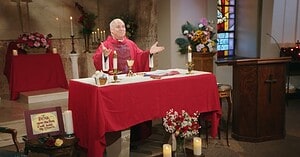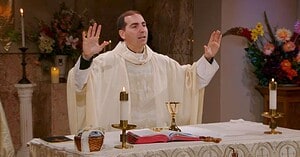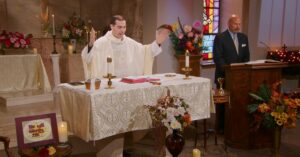Nineteenth Sunday in Ordinary Time
Homily Video
Nineteenth Sunday in Ordinary Time Homily Transcript
>>So they say that everyone struggles with one of the three theological virtues and one of the four cardinal virtues.
Huh? What are those? Just real quick.
Theological virtues are: Faith, hope, and charity.
Cardinal virtues: Prudence, temperance, justice, and fortitude.
Everyone struggles with one, either faith, hope, or charity – but we get the other two down. And then everyone struggles with at least prudence, temperance, justice, or fortitude – we get the other three down. And we see this in the scriptures.
So Moses, for instance, struggles with faith. Moses doesn’t think God is with him. He doubts if the people are going to follow him. He doubts if pharaoh is going to listen to him.
Ah, he asks God’s name. And what does God respond to Moses’ lack of faith? Basically… “No Moses, your fine. You’re going to be able to do it… No, no.
God simply points to Himself. I am with you. I am Yahweh. I will be with you. So God doesn’t cater to Moses’ lack of doubt by giving him reasons to believe, but He simply says look to me. Hope.
Elijah, Elijah in our first reading is a figure from the Old Testament who struggles with hope. He’s just, basically, won this great victory against the false prophets of Baal atop Mount Carmel. And, he’s defeated them and so he’s earned the ire of the king and queen, Jezebel and Ahab. And they’re hunting Elijah down.
So what we have Elijah doing, a little context in our first reading is Elijah’s fleeing Mount Carmel and he’s doing sort of a reverse exodus of Moses.
He’s going back to the desert because he’s hiding. Cause he’s afraid of his life. And he sits down beneath a broom tree and he despairs.
Take my life now Lord, there’s no hope for me. And so, what does God do? He sends an angel and again points to Elijah and says, “Get up and go. Do your work, I will be with you.”
And you notice who’s going to be at top, on either side of Jesus at the transfiguration? Moses and Elijah. Right? The figures who doubt with faith and struggle with hope.
So, brothers and sisters what do you struggle with? Is it faith? Is it hope? Is it love? I think, not that we nail the other two perfectly or we knock the other two out of the park, but hope is something that I think all of us do have a little struggle with. We’re anxious. We’re afraid. We’re worried.
What’s the great antidote to hope? Not anything that the world will offer. Not reading, or exercise, or sports, or drinking, or eating, or gambling – none of those things will satisfy your lack of hope, won’t give you a sense of your salvation.
What will? The only thing that will is the eucharist. The bread of life. The bread of hope. “Anyone who eats my bread will live forever. You will not die,” Jesus tells us. So, the eucharist is the great antidote to despair. It can increase our hope.
So friends, if you’re struggling with hope these days or faith or love or whatever it might be. Just spend some time praying with us today at mass.
Receive the eucharist spiritually in your hearts if you’re not able to physically receive communion and let Jesus tell you, “Have hope, my bread is life for the world.”
Amen.
Readings
First Reading:
1 Kings 19:4-8
Second Reading:
Ephesians 4:30-5:2
Gospel:
John 6:41-51
Featured Text
You can now enjoy Sunday Mass at Mercy Home’s homily in podcast form:
Discover More
Saints Peter and Paul, Apostles
June 29, 2025
The Most Holy Body and Blood of Christ
June 22, 2025
The Most Holy Trinity
June 15, 2025
Request Sunday Mass Guide
The Sunday Mass Guide sent to your home address
Spiritual nourishment and updates from the Sunday Mass community
Monthly reflections from Fr. Scott Donahue, our Principal Celebrant


